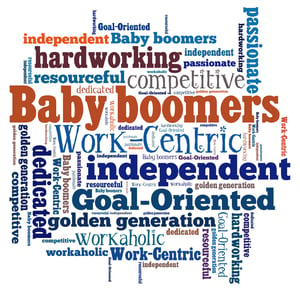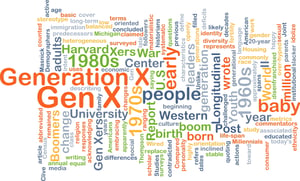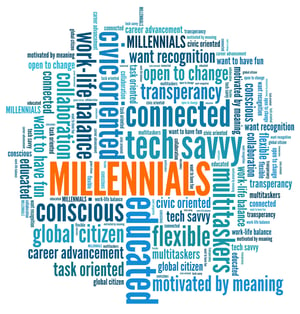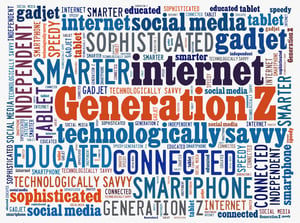There are four distinct generations represented by the majority of Americans in the workplace. According to a study by Dr. Bea Bourne, Purdue University, generational differences have clear impacts at the office. The goal of this article is to encourage awareness so that a diverse workplace can be effectively managed across generations. Generational differences can be relevant, important tools for employers. We are all familiar with the names our culture has assigned to predominant groups in the American workplace:
- Baby Boomers—born 1946 to 1964 - 25% of the workforce
- Generation X—born 1965 to 1980 - 33% of the workforce
- Millennials—born 1981 to 2000 - 35% of the workforce
- Generation Z—born 2001 to 2020 - 5% of the workforce
The workplace should be a place where these different age groups function in harmony, with all generations enjoying and appreciating the fresh and authentic perspective that each group brings. Awareness of these differences can benefit the way we interact with one another and the ability of employers to manage their workforce most effectively, ultimately producing better results. One size does not fit all because each group approaches work from a different point of view. As unique individuals, we are a by-product of the sum of our lives. In spite of this, under the lens of our own group, there are binders that cannot be denied that are inextricably woven into the fabric of who we are. Below is a summary of the common characteristics for each of the 4 groups, with a recommended Employer approach indicated for each.
BORN 1946-1964

Descriptors: Competitive, Workaholic, Team-oriented
Shaped by: The Vietnam War, Civil Rights movement, Women’s Rights, Watergate
Motivated by: Company loyalty, teamwork, duty
Communication style: Whatever is most efficient, including phone calls and face to face
Worldview: Achievement comes after paying one’s dues; sacrifice for success
Stats:
-65% of baby boomers plan to work past age 65
-10,000 baby boomers reach retirement age every day
Baby Boomer Employers should: Provide employees with specific goals and deadlines; put in mentor roles; offer coaching-style feedback
BORN 1965-1980

Descriptors: Flexible, Informal, Skeptical, Independent
Shaped by: AIDs epidemic, fall of the Berlin Wall, .com boom
Motivated by: Diversity, work-life balance, their personal-professional interests rather than the company's interests
Communication style: Whatever is most efficient, including phone calls and face to face
Worldview: Favoring diversity; quick to move on if their employer fails to meet their needs; resistant to change at work if it affects their personal lives
Stats:
-Gen Xers make up the highest percentage of startup founders -55%
-Gen Xers will outnumber baby boomers by 2028
Generation X Employers should: Give employees immediate feedback; provide flexible work schedules and work-life balance; extend opportunities for personal development
BORN 1981-2000

Descriptors: Competitive, Civic-minded, Open-minded about diversity, Achievement-oriented
Shaped by: Columbine, 9/11, the internet
Motivated by: Responsibility, the quality of their manager, unique work experiences
Communication style: IMs, texts, and email
Worldview: Seeking challenge, growth, and development; a fun work life and work-life balance; likely to leave an organization if they don't like change
Stats:
-By 2025, millennials will comprise 75% of the global workforce
-About 15% of millennials age 25–35 live at home with their parents
Millennial Employers should: Get to know employees personally; manage by results; be flexible on their schedule and work assignments; provide immediate feedback
BORN 2001-2020

Descriptors: Global, entrepreneurial, progressive, less focused
Shaped by: Life after 9/11, the Great Recession, access to technology from a young age
Motivated by: Diversity, personalization, individuality, creativity
Communication style: IMs, texts, social media
Worldview: Self-identifying as digital device addicts; valuing independence and individuality; preferring to work with millennial managers, innovative coworkers, and new technologies
Stats:
-40% of Gen Z wants to interact with their boss daily or several times each day
-84% of Gen Z expects their employer to provide formal training
Generation Z Employers should: Offer opportunities to work on multiple projects at the same time; provide work-life balance; allow them to be self-directed and independent
Two sources, The Motley Fool's 9 Baby-Boomer Statistics That Will Blow You Away by Matthew Frankel and Inc. Newsletter's Different Motivations for Different Generations by John Rampton reference interesting facts that can facilitate better appreciation between generations in the workplace.
Baby Boomers - Did you know?:
- 10,000 Baby Boomers are reaching retirement every day in our country. This group is in their late 50’s, 60 & 70’s.
- The number of baby boomers who plan to remain in the workplace after their 65th birthday is on the rise.
- There are 77 million baby boomers in the US. Maine and New Hampshire have the largest population of Boomers, while California, Texas, Georgia, Arizona and Utah have the fewest number.
- 59% of boomers with children are still supporting their children between the ages of 18-39.
- Despite the common perception of the millennial "start-up" culture, baby boomers are twice as likely as millennials to start a new business. Furthermore, 45% of baby boomers consider themselves to be entrepreneurs.
- Baby boomers are projected to have 70% of all U.S. disposable income over the next five years.
- Boomers are often ambitious, loyal, work-centric, and cynical. They prefer monetary rewards.
- Boomers are so goal-oriented generation they can be motivated by promotions, professional development, and having their expertise valued and acknowledged. Prestigious job titles and recognition like office size and parking spaces are important to Boomers.
Generation X - Did you know?:
- 44 to 50 million Americans constitute this group. They're smaller than the previous and succeeding generations, but they're often credited for bringing work-life balance. First-hand views of how their hardworking parents became so burnout was the likely contributor.
- Members of the generation are in their 30's and 40's and spent a lot of time alone as children. This contributed and possibly created an entrepreneurial spirit within them.
- Generation X’ers make up the highest percentage of startup founders - 55 percent.
- This group prefers to work independently with minimal supervision.
- They believe that promotions should be based on competence and not by rank, age, or seniority
- Gen Xers can be motivated by flexible schedules, benefits like telecommuting for certain roles and recognition from the boss
- Bonuses, stock, and gift cards as monetary rewards are effective motivators
- They value opportunities to grow and make choices, as well as having relationships with mentors.
Millennials - Did you know?:
- Millennials are the fastest growing segment of today's workforce.
- They're in their 20's and 30’s and are beginning to come into their own in the workforce.
- This is a tech-savvy generation, currently the largest age group in the country.
- For some Millennials, they're content with selling their skills to the highest bidder.
- Unlike Boomers, they're not as loyal to their firm. In most cases, they have no problem jumping from one organization to another.
- This group can be motivated by offering skills training, mentoring, and feedback. Millennials also thrive when there is structure, stability, and continued learning opportunities.
- Culture is also extremely important for Millennials. They want to work in an environment where they can collaborate with others.
- Flexible schedules, time off, and embracing the latest technology to communicate are also important.
Generation Z - Did you know?:
- This generation is right on the heels of Millennials. They range in age from babies in their cribs to individuals in their early 20’s, and some are starting to enter the workplace.
- They make-up one-quarter of America's population, making this generation larger than Baby Boomers or Millennials.
- This generation is motivated by social rewards, mentorship, and constant feedback.
- They also want to do meaningful work and be given responsibility. Like their predecessors, they also demand flexible schedules.
- Employers can motivate this generation through experiential rewards and badges, such as those earned in gaming and opportunities for personal growth.
- They need and expect structure, clear directions, and transparency.
- The majority of Generation Z individuals prefer face-to-face communication, in spite of the communication options that they are surrounded with.
The question of how to manage different generations in the workplace is clearly challenging, but surmountable. It requires understanding what the differentiators are and using that information to motivate each generation differently. “We have to learn to be mindful of each other and treat each other as individuals," writes Bruce Mayhew. "No matter what generation we are from, it's too easy to keep doing what we are doing now and acting like each generation is (or should be), motivated by the same things that we are."
It is the responsibility of employers to make every employee, regardless of their generation, feel engaged. Employees should be welcomed and integrated into the company's culture and made to feel valued. This involves deliberate attention and begins with hiring the right persons for the job, with the appropriate skillset. Recruitment should also include determination of best fit within the company's culture. Employers should create a clear purpose and meaning for each employee’s work. Sharing the company’s mission statement and cultural vision are important ways for employees to understand company values and why their role matters. Finally, employers should remember to encourage work-life balance to avoid burnout, offer health and savings benefits, and provide rewards that are meaningful to all 4 generations. Gloria Steinman put it well when she said, “we need to remember across generations that there is as much to learn as there is to teach.”
Veritas Total Solutions is a management consulting firm. We specialize in various strategy & transformation solutions that enable companies and professionals to transform their businesses. Having a deep understanding of the workforce enables us to help transform businesses. If you are interested in learning more about our specific capabilities, contact us or subscribe to our blog to stay connected.

